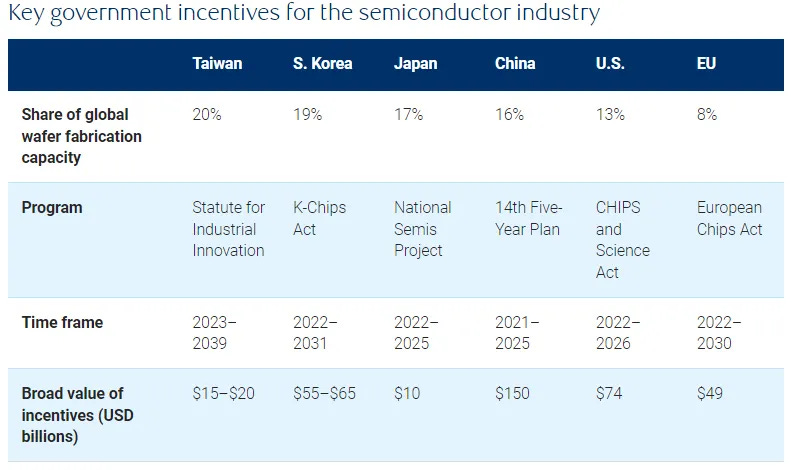🚀 Shaping the Future - Issue 20
Happy Thanksgiving to all members of our incredible community, we're thankful for each one of you. 🧡🦃
🦃 Wishing You a Happy Thanksgiving 🧡
The Industry 4.0 Club would like to reach every member of our community a very happy thanksgiving. We extend our heartfelt thanks to each and every one of you for being a valuable part of our community.
🚨 The Industry 4.0 Club will be at ATX West
ATX West returns to Anaheim, California, on February 6-8, 2024, uniting the greatest minds in automation to advance manufacturing excellence. The Industry 4.0 Club will be hosting the Advanced Engineering panels.
Stay tuned over the next few weeks as we unveil the distinguished guests and topics to be featured at the conference. Don't miss out – registration is now open. Secure your spot to be part of this conference.
📝 Managing Processes in Digital Transformation
In the second part of this series on digital transformation, the focus shifts to the critical role of process reengineering. The article emphasizes the importance of a holistic approach, urging organizations to "Think Big, Start Small" to ensure scalability and integration considerations from the outset. It highlights that successful digital transformation goes beyond technology, addressing the need for effective information sharing across organizational silos. Challenges related to organizational culture, data democratization, and aligning technology with business objectives are discussed. The article underscores the significance of business process reengineering (BPR) in adapting legacy processes to new technology, emphasizing the need for a tailored approach. It outlines the benefits of BPR, such as enhanced efficiency, adaptability to disruptions, increased customer satisfaction, and motivation of the workforce. The importance of identifying and preserving specialist processes is emphasized, cautioning against blindly adopting blueprints from internet giants. The article concludes with practical steps for implementing BPR, including the need for effective change management and continuous monitoring of the redesigned processes.
📣 Preview of Upcoming Advanced Engineering Sessions at ATX West 2024
We unveil the second reveal of the Advanced Engineering sessions scheduled for ATX West, set to unfold in Anaheim, California, from February 6-8, 2024.
📌 Title: Unlocking Operational Excellence: The Impact of Automated IT Security
📝 Abstract: In this dynamic and insightful 30-minute speech, we will delve into the transformative power of automated IT security auditing for manufacturers and its profound implications for achieving operational excellence.
Manufacturers today are operating in an era defined by relentless technological advancements, where the security of their IT ecosystems is paramount. Automated IT security auditing emerges as a game-changer, offering multifaceted benefits that ripple through the entire organization.
Our journey begins with the promise of enhanced efficiency. Through automation, every facet of the manufacturing process is optimized, streamlined, and fortified with security. The result? Everything works better. This newfound harmony across operations is the foundation upon which operational excellence is built.
Increased efficiency is only the tip of the iceberg. Productivity and performance soar to new heights as technology takes on the burden of auditing, freeing up human resources for value-added tasks. Manufacturers witness a notable reduction in the cost of service, leading to an uptick in client retention and brand loyalty.
As the cost of service decreases and operational efficiency surges, the manufacturer's bottom line sees a substantial boost—higher profits become the new norm. It's a testament to the transformative power of automated IT security auditing, where technology not only safeguards the organization but propels it toward unprecedented success.
Join us as we explore the key components of this paradigm shift, from efficiency gains to enhanced productivity, cost reduction to client retention, and ultimately, the coveted realm of higher profits. Discover how embracing automated IT security auditing can set your manufacturing organization on a trajectory towards operational excellence in today's fast-paced, digitally-driven landscape.
👤 Presenter: Elizabeth Wu, CEO, Cybersecurity Auditing Technologies, Inc.
✍️ Bio: Elizabeth Wu is the visionary CEO of Cybersecurity Auditing Technologies, leading a groundbreaking company committed to reshaping the cybersecurity landscape and preventing data breaches. With a remarkable track record in the technology sector, Elizabeth is celebrated for her dynamic leadership and unwavering dedication to achieving operational excellence.
Leveraging her extensive experience in IT, Elizabeth has spent decades advocating for the empowerment of business leaders. Her lifelong mission has been to provide them with unrestricted access to their organization's IT data, ensuring stability, security, and peak performance. Elizabeth possesses an unrelenting passion for innovation and an unwavering commitment to safeguarding businesses. She has harnessed her expertise in IT security auditing to drive Cybersecurity Auditing Technologies as the next generation of technology-driven IT security auditors.
Under Elizabeth's astute leadership, Cybersecurity Auditing Technologies aims to furnish business and IT leaders with comprehensive insights into the security, financial, and operational aspects of their IT ecosystems. Her resolute dedication to delivering robust, efficient, and cutting-edge security solutions has firmly established her as a prominent figure in the field. Elizabeth Wu is not just a CEO but a visionary leader, dedicated to fortifying the cybersecurity posture of organizations worldwide.
📚What we’ve read this week
Building a More Sustainable Factory Floor Leveraging Smart Manufacturing [RT Insights]
Auto manufacturers are increasingly adopting smart manufacturing strategies to enhance sustainability in their operations. This involves reducing energy use, minimizing CO2 emissions, and decreasing waste. The shift towards sustainability aligns with customer preferences and helps manufacturers comply with global environmental regulations. Statistics highlight the significance of the issue, revealing that industrial facilities consume 33% of global energy, with 77% of industrial electricity going to manufacturing. Waste generated in car manufacturing has increased by 32% per car from 2005 to 2022. Smart manufacturing technologies, including edge devices, sensors, machine learning, and AI, enable manufacturers to collect and analyze data, optimize processes, and reduce energy consumption. Digital twins and virtual simulations allow testing and optimization in a controlled virtual setting, enhancing efficiency and sustainability. Beyond the production floor, smart technologies are applied to supply chains and logistics, providing real-time data for informed decision-making, reducing overproduction, and optimizing routes to minimize fuel consumption and emissions. Siemens offers a Smart Manufacturing Xcelerator portfolio to support auto manufacturers in implementing intelligent manufacturing, including digital twins and closed-loop feedback for predictive insights to enhance sustainability in auto manufacturing.
Cadence and Autodesk Collaborate on Smart Product Design [Cadence]
Cadence Design Systems, Inc. is collaborating with Autodesk to expedite intelligent system design through the integration of Autodesk Fusion and Cadence PCB solutions. This partnership facilitates seamless two-way communication between PCB designers and mechanical engineers, addressing challenges associated with manual design data methods that often result in errors, re-work, and delays. The objective is to improve collaboration between electronic and mechanical engineering, enabling efficient co-design and empowering companies to harness cloud-based mechanical design, generative AI/ML PCB design, and multiphysics analysis for power, thermal, and electromagnetics. The joint solution aligns with Cadence's Intelligent System Design strategy.
The Chip Industry’s Reshoring Revolution [RBC]
Several nations, recognizing the strategic significance of semiconductor manufacturing, are making substantial investments to bolster their capabilities. In the U.S., the CHIPS and Science Act proposes a $52 billion allocation in subsidies, with significant investments from companies like TSMC and Samsung in establishing fabs within the country. China, aiming to reduce reliance on foreign-made chips, initiated a $50 billion investment in 2014, with plans to increase this to $100 billion to $150 billion. Despite progress, China has yet to achieve complete self-reliance and remains a significant importer of semiconductors. In Europe, the European Chips Act seeks to double the EU's global semiconductor market share to 20% by the decade's end. TSMC, in collaboration with European firms, has unveiled plans to construct a €10 billion ($10.7 billion) plant in Germany.
This 3D Printer Can Watch Itself Fabricate Objects [MIT News]
Engineers from MIT, the MIT spinout Inkbit, and ETH Zurich have devised a 3D inkjet printing system incorporating computer vision for real-time adjustments in material deposition. In contrast to traditional 3D printers using mechanical parts for resin smoothing, this contactless system scans the printing surface and adapts the amount of resin deposited by each nozzle. Notably, it accommodates a broader range of materials, including slower-curing options with enhanced properties like increased elasticity, durability, or longevity. The team showcased the technology by crafting a 3D-printed robotic gripper resembling a human hand. This innovative approach provides precise control over material deposition, unlocking the potential for utilizing diverse materials in 3D printing.
Reliability and Hardware Design Survey [Molex]
Molex surveyed over 750 system architects and design engineers across the globe to better understand today’s challenges to reliability and what the future may bring. Below are some insights from the report:
A nearly unanimous 98% of respondents report challenges designing for reliability, with time for testing (42%) topping the list.
Only 33% of respondents use data-based models to help evaluate design tradeoffs. Most rely on a combination of predetermined design priorities and judgment calls
91% of those surveyed agree that reliable products can’t be built without trusted and proven suppliers. Supplier expertise and engagement are even more critical when considering that 74% of engineers agree that reliability may be at risk due to shortening design cycles.
The vast majority of respondents (96%) have concerns about overall reliability in electronics products, with increasing complexity of devices (53%) and growing customer expectations of reduced costs (49%) topping the chart.
🎤 Upcoming Events
👋 Get Involved
Join the Industry 4.0 Club and be part of our vibrant community, dedicated to shaping the future of manufacturing. By actively participating, you can make a meaningful impact in advancing Industry 4.0 and contribute to reshaping the manufacturing landscape.
We’re always looking for new contributors to share their expertise, experience and spread the word. You can contact us directly at info@industry40club.com with subject like “Getting Involved” and follow us on all social media (LinkedIn & Twitter) or donate to help fund the club’s activities.
💬 About Shaping the Future
Shaping the Future is Industry 4.0 Club’s official newsletter. We’ll be experiencing different formats over the coming weeks until we find the one that resonates the most with our members. You can help us improve by sharing feedback and suggestions. The newsletter will land in your inbox every Sunday morning; please subscribe to not miss anything and forward the email to someone you think would benefit from this.
If you were forwarded this and found it interesting, please subscribe and share!










